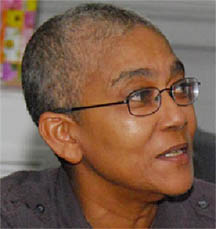Whenever Norma Adrian visited the La Grange Police Station to make reports against her husband, she was often met with either accusations—“Wah yuh do he?”—or dismissals—“That’s husband and wife story.”
According to Adrian, who is a domestic violence survivor, the system that was set up to protect women in such situations ended up failing her instead.
She recalled one particular instance where, overwhelmed with frustration, she broke down in tears at the police station. However, instead of taking her report at that point in time, the officer forced her to go outside and try to compose herself before she was willing to take her report. Adrian said it was only until she sought the assistance of Red Thread that she got the attention of the police.

Adrian spoke last Friday at a news conference, where Red Thread renewed a call for Guyanese to seriously address violence against women and children.
According to Karen de Souza, co-founder of Red Thread, experiences such as Adrian’s deter victims from filing reports.
de Souza said while the police deserve to be acknowledged for the improvements they have made so far in their response to domestic violence, they are still a long way from where they should be. She noted that often police show little sensitivity to victims of domestic violence who attempt to file police reports.
She added that “lazy policing” is another obstacle that Red Thread is trying to overcome as it continues to fight against domestic violence. This, she said, manifests in the form of police officers failing to properly investigate reports of domestic violence; instead, they rely on “word of mouth” of the very perpetrators who may claim that he or she was injured by their victims. As a result, victims find themselves before the court, charged alongside their abusers. This, de Souza noted, creates even more hassle for the already traumatised victim. As a result, she urged police to adopt a more understanding and sensible approach when dealing with such matters.
de Souza also highlighted flaws in the probation system, where counsellors encourage victims of abuse to give their abusers a second chance by coercing them with “backward messages,” such as the sanctity of marriage. “We still have people in our formal system who are peddling these backward messages, who are treating women in ways that cause even more damage,” de Souza lamented.
More importantly, she said, is the need for funding of work for the prevention of violence, since the public needs to be more sensitised about the social ill that is domestic violence as well. Also needed, she added, is the funding for provisions to deal with the aftermath of domestic violence. “The national budget needs to provide assistance to domestic violence victims so that they can become financially self-sufficient… One of the main reasons women find themselves going back to their abusers, regardless of how bad they are being abused, is that they cannot find a place to stay, they cannot stay in the shelter forever,” de Souza stated.
de Souza also renewed a call for the government to make provisions for subsidised housing for survivors of domestic abuse, so they are not forced back in to the abusers clutches and especially those survivors with children.
de Souza posited that if changes to the system are not made soon, it could foster the development of a “lash back” system. This system, she explained, would see women who have fallen through the cracks of the system curtailing their abuse by lashing back or, in some cases, resorting to suicide as a means to escape the abuse. So, in hopes of averting an “eye for an eye” situation, de Souza called for changes to be made in the system.
Meanwhile, Red Thread member Joy Marcus, reading from a prepared statement, said more work is needed as it relates to both policing and protective systems as they are currently dysfunctional and inadequate.
With no half-way houses for abused women and their families, limited numbers of quality counsellors to help the victims and the perpetrators of domestic violence along with just one domestic violence shelter, Marcus said the systems that are supposed to be in place to support victims of domestic as violence are “broken and not functioning as they should be.”
She noted that economic violence also needs to be addressed as it is a significant reason why many women remain in abusive relationships. “The only way violence will be eliminated is if we cultivate a culture of no-tolerance for violence of all kinds—not only physical, but also verbal, emotional/psychological, and financial. This is the task of every individual Guyanese,” she read from the statement.
November 25th is annually commemorated as World International Day for the Elimination of Violence against Women. According to the United Nations website, 35% of women and girls globally have experienced some form of physical and or sexual violence in their lifetime.
Meanwhile, a total of 18 women have died this year in Guyana as a result of domestic violence, with the latest Melissa Skeete, a dispatcher at the Georgetown Public Hospital Corporation, who was stabbed and left for dead after being thrown out of a car by a former partner.




